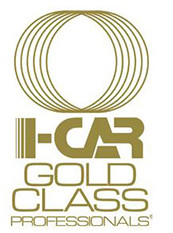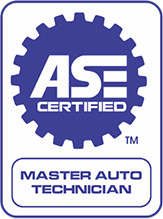Choosing the right auto body shop can feel like a stressful task. It goes without saying that you want shops with experienced technicians and proper equipment. But how do you know if a collision repair shop has them?
Sure, there’s word of mouth, and insurance company recommendations, but the fact of the matter is, you can confirm whether a shop stands among the finest out there without having ever heard of it.
All you have to do is find out if the auto body shop has the required qualifications, because they guarantee its capability to perform the best repair on your car.
If you see that a collision repair shop holds I-CAR and ASE certifications, then you can count on your vehicle getting properly repaired. It means that not only does the auto body shop have the required equipment to restore your car, it has officially trained technicians to use it. You’d be surprised how many facilities lack the necessary resources to efficiently and correctly perform a repair.
Another strong indicator of a qualified auto body shop is sponsorship by the car manufacturers themselves. Companies like Mercedes-Benz, Audi, Porsche, Chevrolet, Toyota, and many others, will sponsor and certify a collision repair facility to fix its vehicle models, on the condition that it has already earned a strong reputation for quality, efficiency and excellent customer service.
Only a repair facility with I-CAR and ASE certifications will also receive sponsorship from a manufacturer. If you’re having your car repaired at a facility with these qualifications, you know you’re in good hands.
Now let’s explain in greater detail what the above-mentioned certifications actually mean, to help you understand why any solid auto-repair facility should have them.
Industry Training


Two certifications represent the main pillars of proper training in the automobile industry. If an auto body shop has both of them, they have earned the right to say they perform the best car repairs.
I-CAR Gold Class and Platinum Certifications
I-CAR is the Harvard of collision repair training institutions. If you’re certified by I-CAR it means you’re an expert. The non-profit organization makes consumer safety in the collision repair industry its business, and to do that, it gives technicians first-class training.
So what’s the difference between a Platinum and Gold Class certification besides the color? Here’s an important distinction to make. The technician gets the Platinum card, and the repair facility is certified as Gold Class. An auto body shop whose technicians are all platinum-certified becomes Gold Class.
The Gold Class certificate means a shop offers the best standards of quality collision repairs. It’s the highest training achievement a repair facility can strive for in the industry.
What’s more, shops with the I-Car Gold Class rating show an increased level of quality and improved rate of productivity. The I-CAR Professional Development Program makes sure a repair facility is up-to-date on all the ins and outs of general industry repair methods, to make sure your car repair is top-notch.
Automotive Service Excellence (ASE)
The National Institute for Automotive Service Excellence (ASE) sets the bar high when it comes to certifying automotive professionals. ASE certification is a technician’s ticket to having their expertise recognized, allowing shop owners and service customers to properly gauge their skills before hiring their services.
Getting the ASE certification requires a technician to undergo rigorous training and to pass extremely difficult tests. In addition, not just anybody can take the test. The academy audits the people trying to get certified with the precision of an airport security profile check. To make things even harder, there’s no study guide for the test—you either know your stuff or you don’t.
How does the ASE relate to the I-CAR Platinum certification? There is some overlap, as the necessary training for the ASE certification will come from I-CAR. You rarely find a technician without the I-CAR platinum certification that can pass the ASE test. So if you see a shop’s technician has the ASE certification, rest assured and enjoy some peace of mind. Your car is in good hands.
Manufacturer Training
While the ASE and I-Car certifications equip technicians with top of the line skills for repairing vehicles, to go the full nine yards and operate on specific models, they also need manufacturer training. It’s one thing to have mastered repair processes, it’s quite another to know how to fix a particular make. Every car model has its own unique protocol for an excellent repair, and manufacturers require technicians to learn how they’re done.
But here’s the catch: if a shop isn’t sponsored by a car manufacturer, its technicians won’t get the specific training needed for particular vehicle models. To get sponsorship from a manufacturer, a repair facility needs to already have earned a solid reputation. Carmakers will only select shops that have the capacity to properly fix their cars. The I-CAR Gold Class and ASE certifications are tell-tale signs not only for the customer but for a manufacturer looking to offer sponsorship.
Manufacturers won’t provide the tools and training to repair their vehicle models if they don’t think an auto body shop will be able to apply them to their clients’ vehicles. There are thousands of auto body shops out there offering to fix particular cars, but a manufacturer will only sponsor one or two of them to get the certification to fix them.
Proper Tools and Repair Procedures
When a manufacturer sponsors a shop to fix one of their particular models, they will specify the types of tools to be used, and these tools are super expensive.
For example, Mercedes Benz requires specific spot welders costing over thirty grand, for different vehicle models. That’s because by using equipment tailored to fix a certain car, you ensure that the vehicle will be restored according to the carmaker’s standards—and not the standards of the shop or the insurance carrier.
Most shops won’t invest that kind of money into one piece of equipment unless they know they’ll get access to the training on how to use it, and more importantly, they know they’ll get a lot of work from the manufacturer.
Technicians at sponsored shops must undergo training at the manufacturer’s facilities, which can entail traveling out of state for two weeks. Repairmen might learn about performing aluminum welds to do structural repairs, replacing frame rails on hi-tech vehicles like Audi Q7s, or learning to use Mercedes Benz’s stop welder—the list can go on and on.
Once trained, a technician will have to carry out a repair in front of a monitor. If they prove their ability to restore the car to the carmakers’ criteria, the technician gets a certification vouching for their expertise in that particular model.
To sum up, a shop with sponsorship from a manufacturer guarantees the most highly skilled technicians. If a technician can prove their ability to properly repair a vehicle to its maker, then he or she will be able to prove that ability to you.
Access to Technical Repair Manuals
This might seem obvious, but you’d be surprised how few repair facilities actually go out
of their way to purchase repair manuals for every car model out there. They’re the perfect technical aid for a technician carrying out specific repairs on specific vehicles.
The manuals tell you what tools and materials are needed, and they give you precise measurements shown to the millimeter. Without such meticulous details on how repairs should be performed on particular vehicles, technicians can cause permanent damage.
Here’s a small list of the kinds of things a technical manual for a car model will dictate to a technician:
- The specifics on how to replace a structural part.
- The required torque pressure of fastening bolts on panel replacement repairs such as bumper covers, doors, hoods, trunks, etc.
- The unique characteristics of the panel needing repair.
- The protocol for proper alignment and gap tolerance.
Few shops take the time to invest in these manuals and make sure their technicians understand them. The manuals are constantly getting updated, so if a shop doesn’t have the latest manuals, you run the risk of a second-rate repair. That’s only going to cost you more money in the long run.
The Future of Collision Repair
New car models with increasingly sophisticated, cutting-edge technologies are coming out all the time. It’s no longer enough to get industry certifications and then learn from everything else from experience. Training must now be ongoing to keep up the pace with the evolution of how cars are manufactured.
If a shop holds the I-CAR Gold Class certification, and its technicians also have ASE certifications, it means they’re the best at what they do. If they are sponsored by the manufacturers themselves, then you can be sure their technicians are ready for your car, no matter how modern the make or how hi-tech its equipment, the job gets done the right way.
So keep a lookout for shops with the following:
- I-CAR Gold Class (which means all the technicians have I-CAR Platinum certifications)
- Technicians with ASE certificates
- Manufacturer Sponsorship
- Updated technical repair manuals
At Eli’s Collision Repair, we’re proud to say that in our 40+ years of fixing cars, we can put a checkmark next to every item on the list. Contact us today for a preliminary estimate without having to leave your house.
